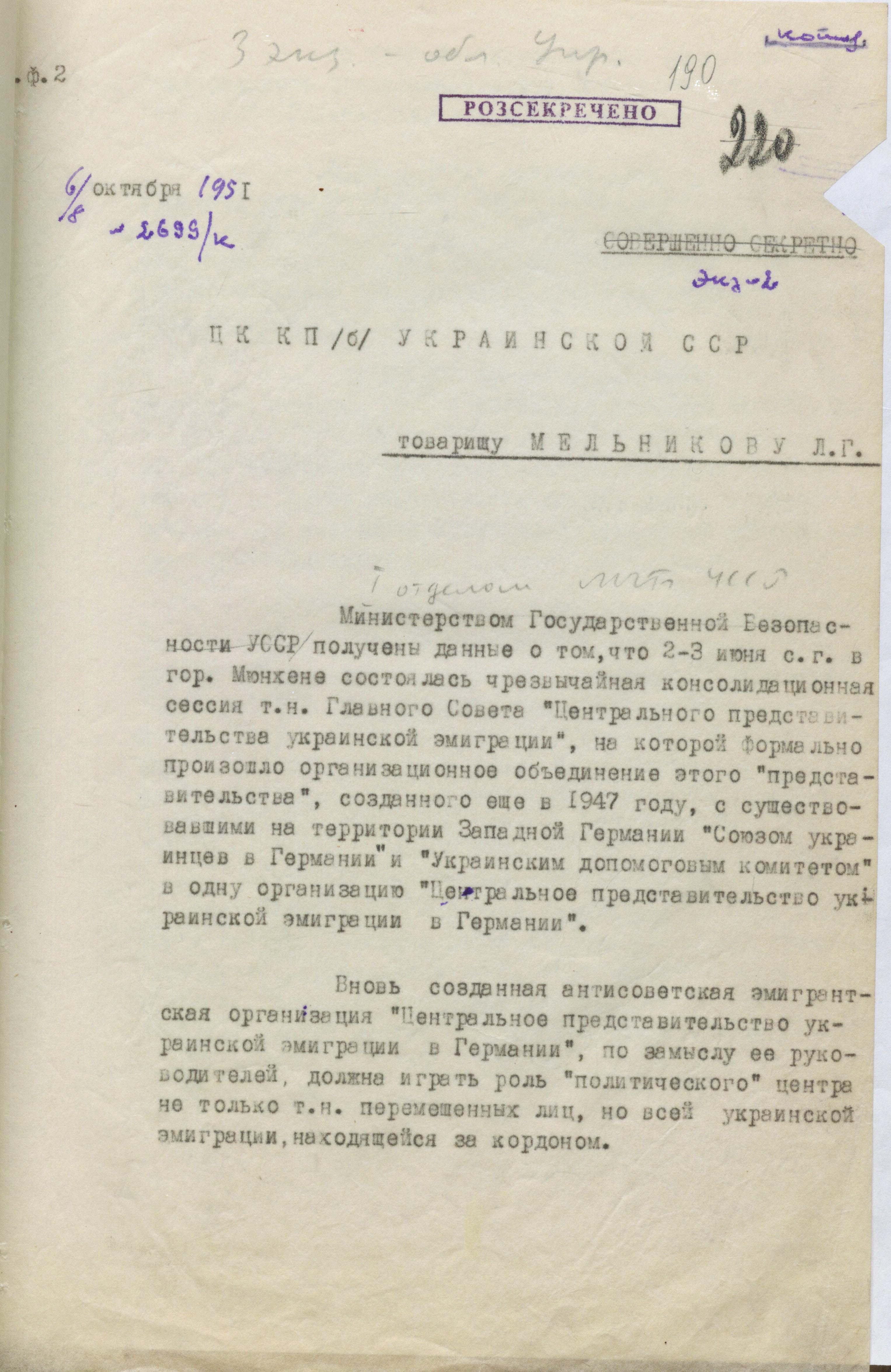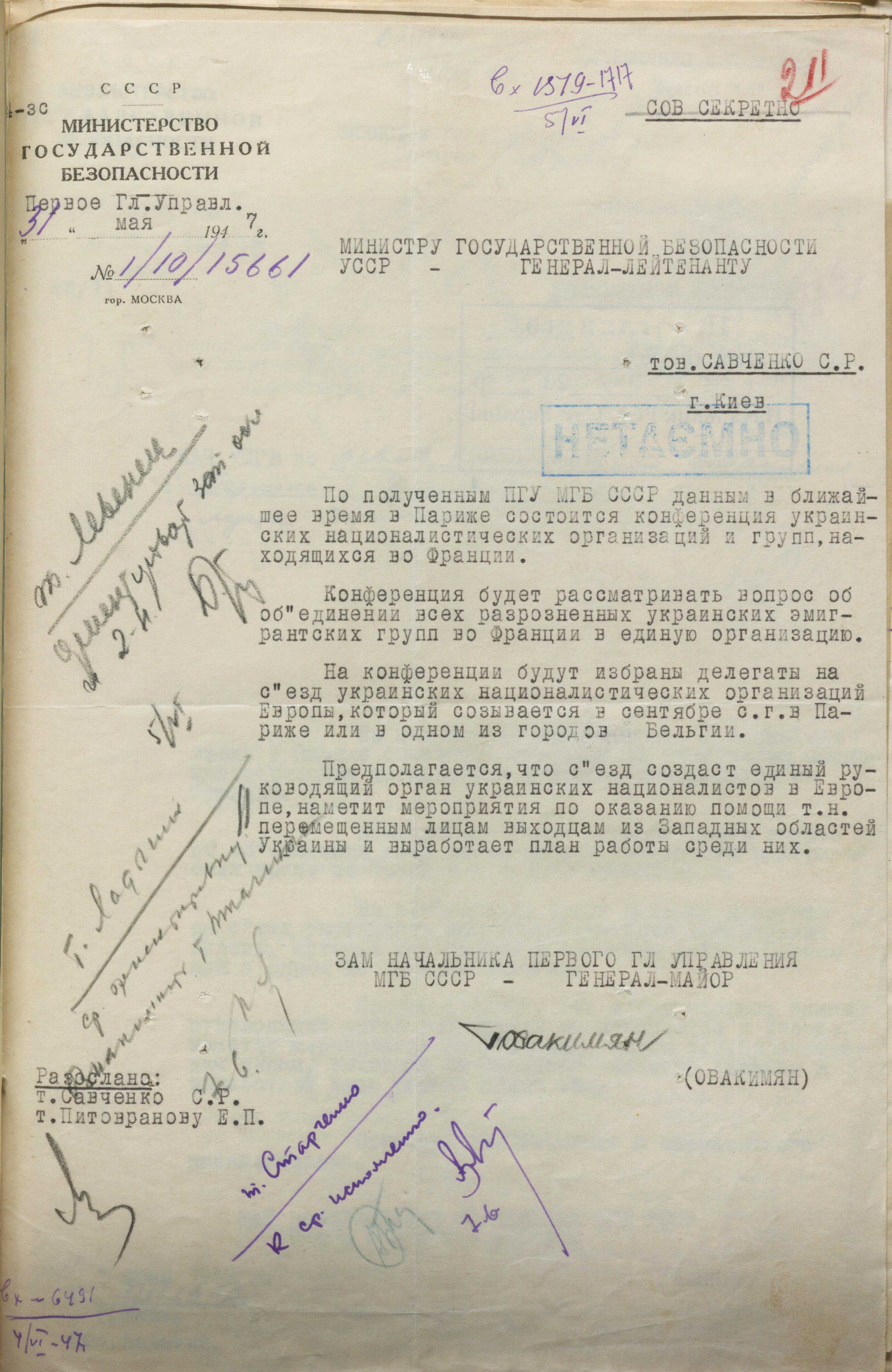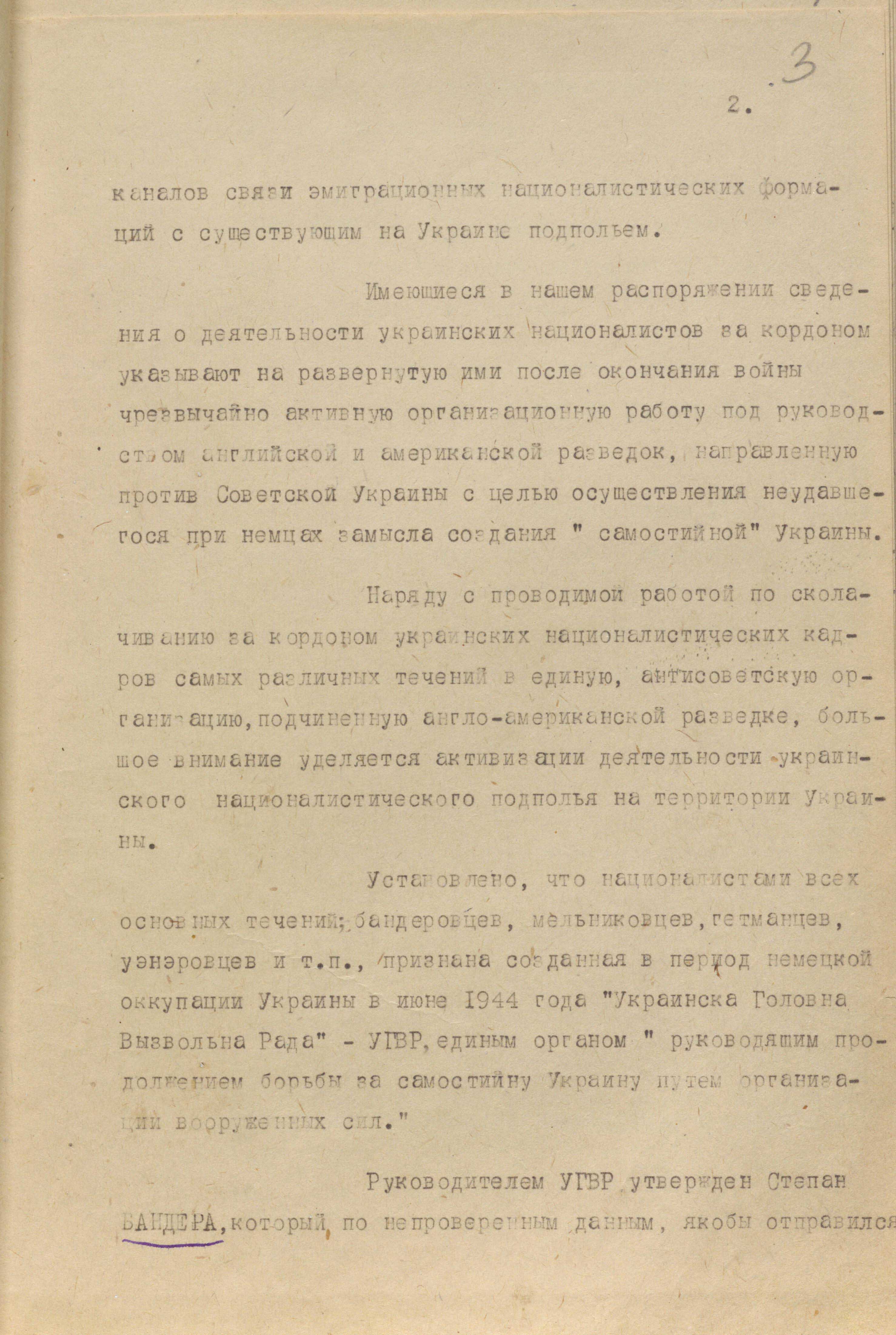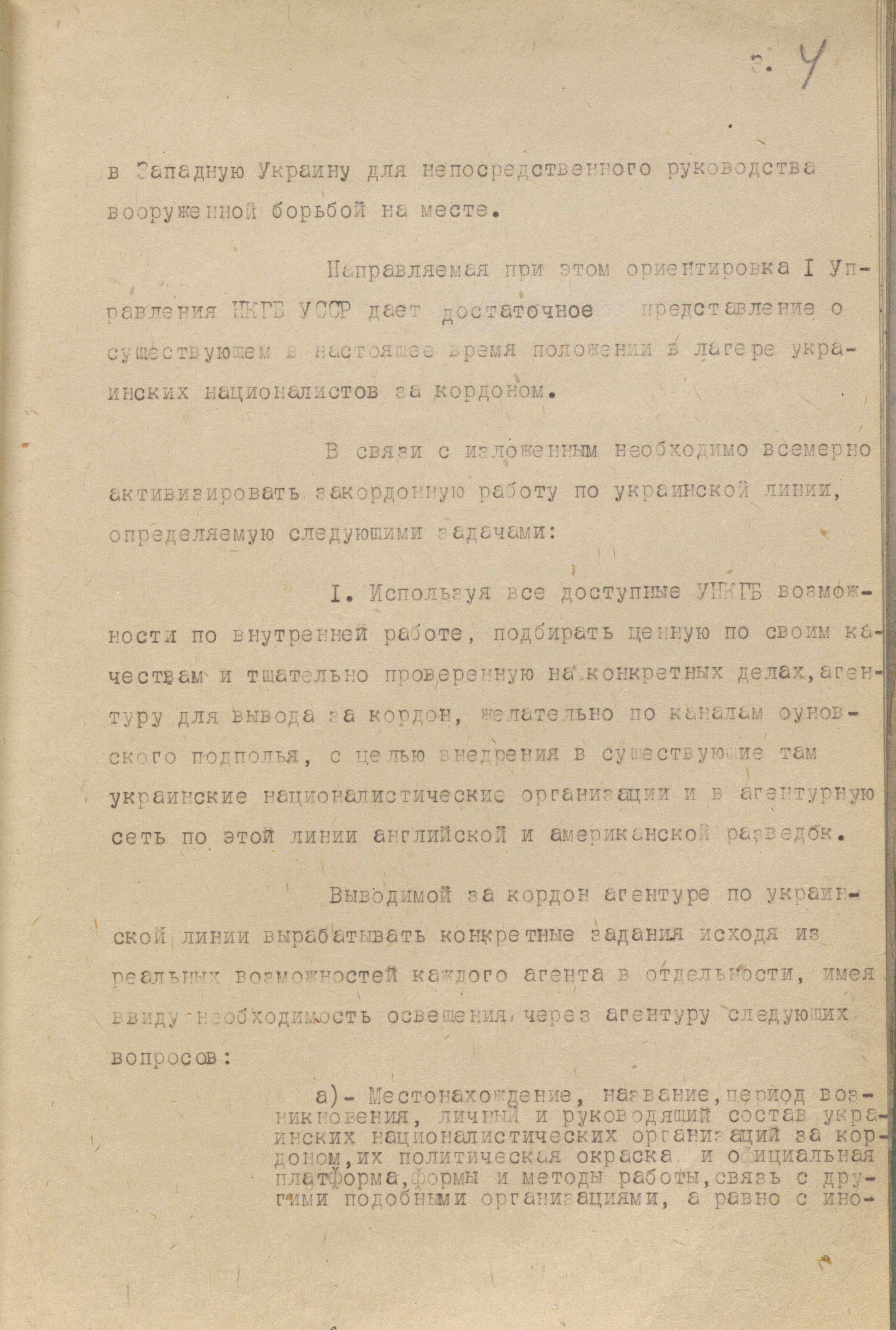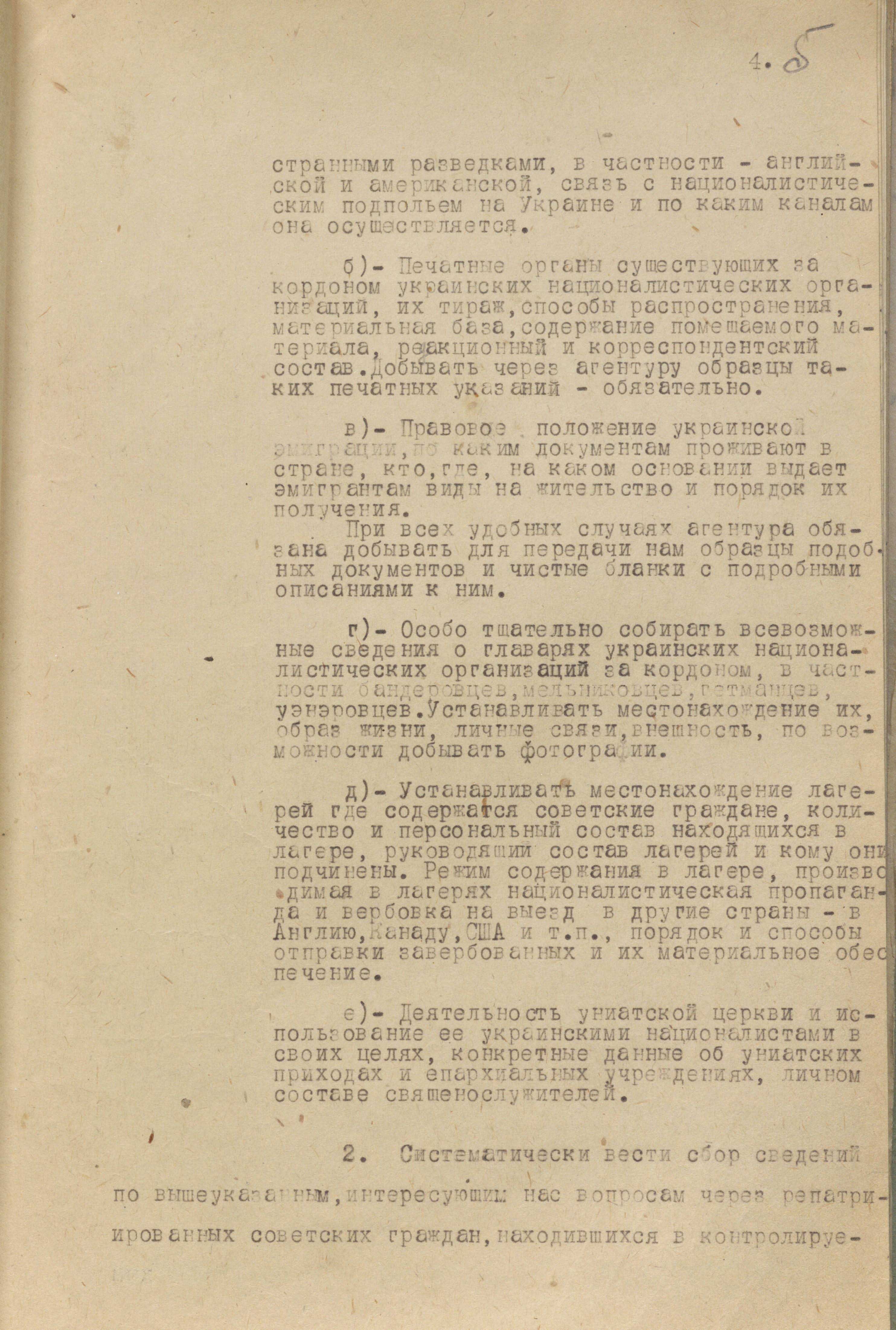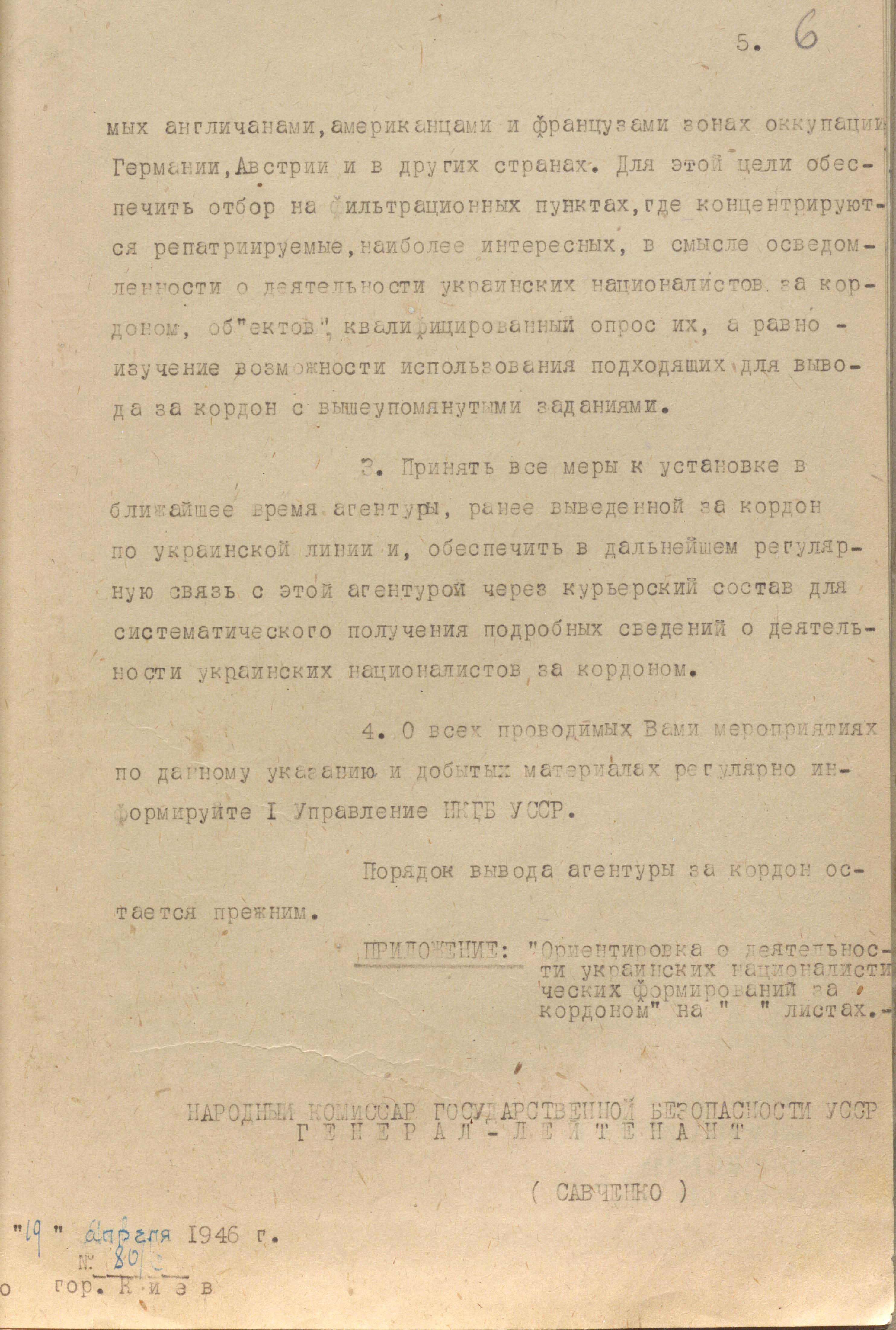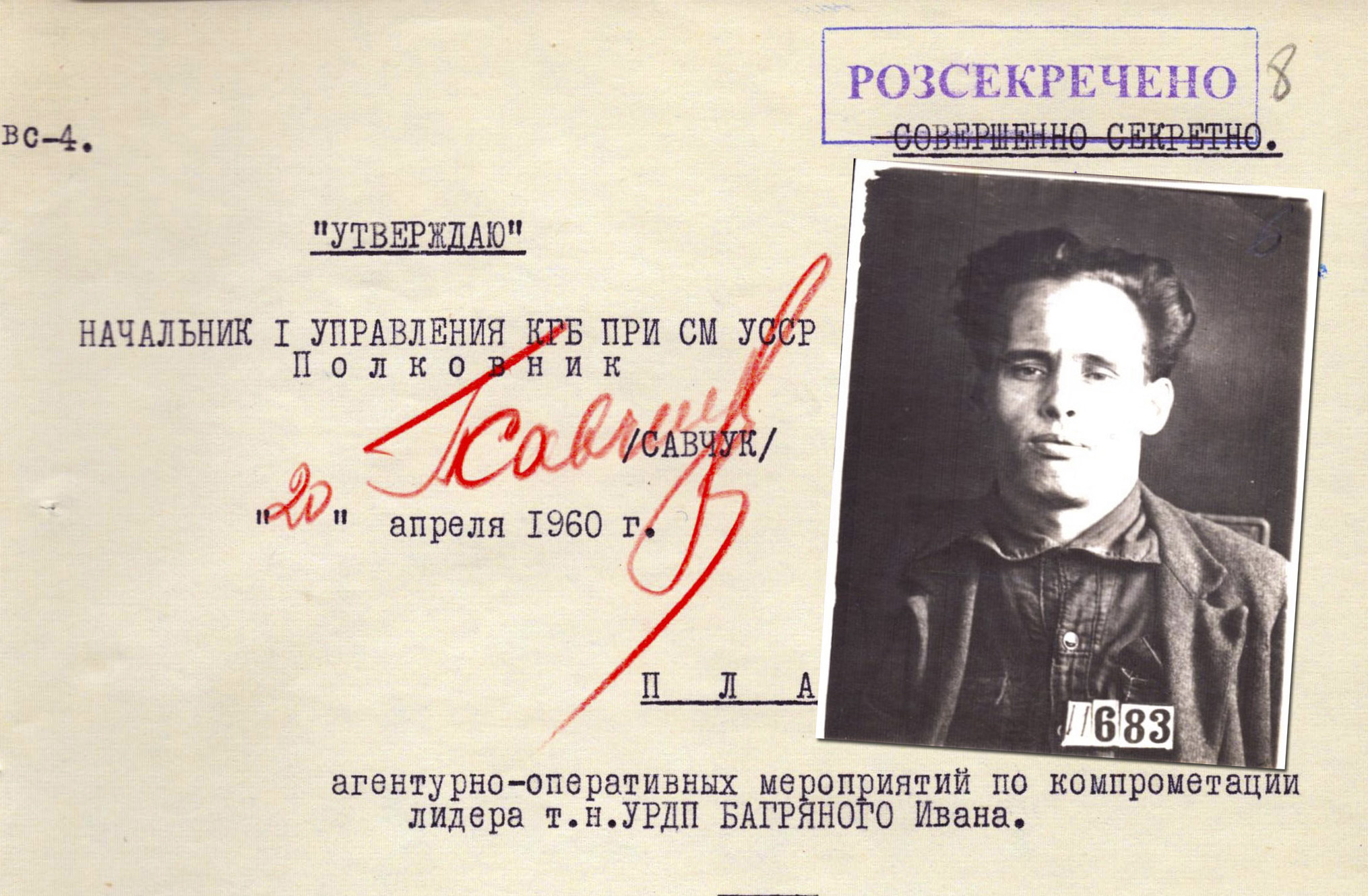“Launch Intelligence and Propaganda Work on Ukrainian Emigrés”
3/22/2023
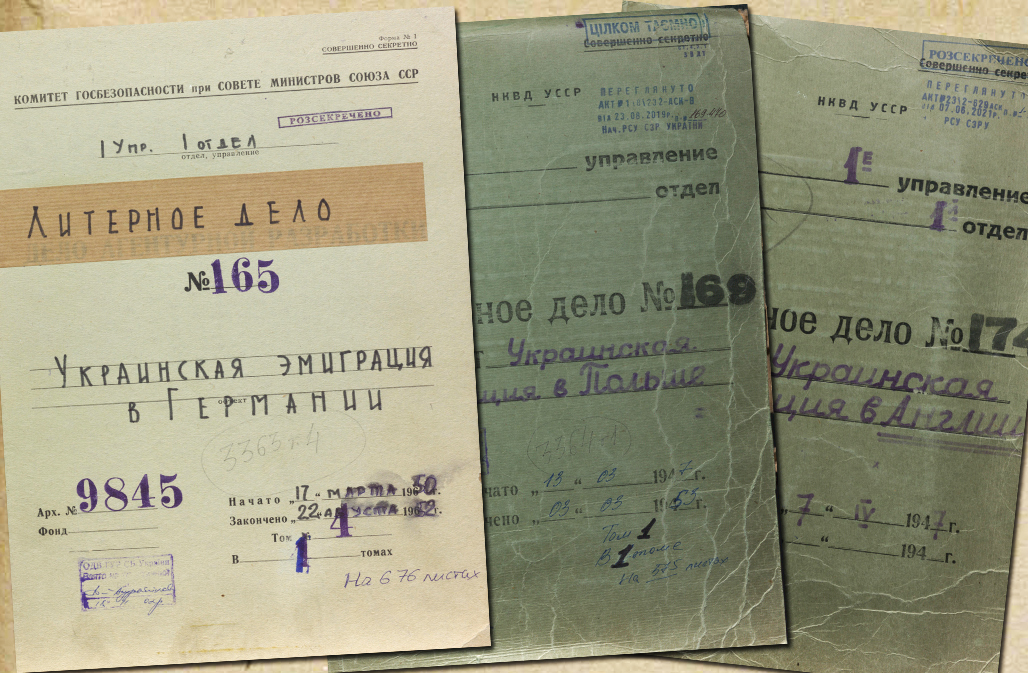
As a result of the Second World War, a huge number of Ukrainians found themselves outside their homeland for various reasons. Some of them returned to the USSR through voluntary or forced repatriation. The rest did not want to return mostly for political reasons and remained in Europe, South America, the United States and Canada. The processes taking place in the environment of Ukrainian émigrés of that time became subject to special attention of the Soviet special services. The MGB/KGB infiltrated their agents into various organizations and movements, trying to split them, provoke conflicts with local authorities, and conducting propaganda actions to justify Soviet policy. This is evidenced by declassified documents from the archive of the Foreign Intelligence Service of Ukraine.
In 1946-1947, the MGB of the Ukrainian SSR started a number of cases entitled “Ukrainian Emigrés in Germany”, “Ukrainian Emigrés in England”, “Ukrainian Emigrés in Poland”... Settlements with compact living of Ukrainians abroad were taken into operational development. Here is the wording from one of the resolutions: “In order to concentrate these materials and further develop them, start an operational case “Ukrainian Emigrés in France”, for which purpose use the materials available from the operational Case 95 “Ukrainian Nationalists in European Countries”.
What kind of materials were those? First of all, information about camps for displaced persons, the so-called Di-Pi (displaced persons). They contained former prisoners of war, Ostarbeiters, refugees and persons evacuated by German authorities, members of the OUN, UPA and other political organizations who did not want to return to the USSR in order to avoid repression.
Archival documents mention the camps in which the greatest number of Ukrainians stayed. They were located in the cities of Regensburg, Mittenwald, Berchtesgaden, New Ulm, Augsburg, Aschafenburg, Elwangen, Munich, Hanover, Heidenau, Weiden, Traunstein, Hersfeld and others. It is noted that Ukrainians intensified organizational work on establishing cultural and educational work, teaching children in schools of various levels, educating young people in cultural societies and the Ukrainian Scout organization Plast; they founded or restored a number of research, educational and other institutions, newspapers, created so-called assistance committees and funds that were engaged in raising funds to help people settle in a new place.
Ukrainians united and clearly stated that they were not going to live out their days in exile, their goal was to continue the struggle for Ukraine's independence, to resolutely defend their interests, rights and freedoms, to draw the world community’s attention to the Ukrainian issue, to debunk the Stalinist communist regime and Soviet propaganda, which captured Western countries.
According to archival documents, after the war, the leaders of Ukrainian political parties returned to the idea of creating a single consolidated center that would unite all Ukrainian emigrés around them. There was an attempt to give the Ukrainian National Council (UNRada), founded in 1948, the character of an exile Parliament of six political parties: the Ukrainian Socialist Party, the Ukrainian Revolutionary Democratic Party, the Ukrainian National Democratic Association, the Organization of Ukrainian Nationalists (under the leadership of Colonel Andriy Melnyk) and the Organization of Ukrainian Nationalists-Revolutionaries (under the leadership of Stepan Bandera). Among the most active fighters against the Soviet regime was the Anti-Bolshevik Bloc of Nations (ABN) – a subsidiary organization of the OUN-r (Bandera) led by Yaroslav Stetsko. The ABN acted as an international association of politicians in exile who represented the “nations enslaved by russia” of the USSR and Central and Eastern Europe.
Taking into account the fact that Ukrainian emigration turned out to be the most organized, active and consistent in critical attitude to the kremlin's policy, the USSR state security bodies meticulously monitored its activities. In the first post-war years, a number of orders, instructions, and circular letters were issued on this subject.
For example, in April 1946, People's Commissar of State Security of the Ukrainian SSR Serhiy Savchenko signed a directive addressed to all heads of departments of the NKGB, entitled “On the Tasks of Intelligence Work on the Ukrainians Abroad”. It was accompanied by the orientation “On the Activities of Ukrainian nationalist Formations Abroad”. At that time, the concept of “nationalist” included almost all Ukrainian centres abroad. The orientation points out that Ukrainian emigrants after the war were concentrated mainly on the territory of Germany, Italy and Austria, which was controlled by Anglo-American troops. “The first period of resumption of organizational activity of Ukrainian nationalists after the defeat of Germany”, the document says, “was characterized by the desire of the latter to concentrate all refugees in special camps created by the British and Americans, to prevent the repatriation of Soviet citizens to the USSR and to achieve the granting of asylum rights to all refugees as political emigrants”.
In addition, information is provided on the activities of the Ukrainian Assistance Committee (UDK) headed by Vasyl Mudryi. It is noted that the Committee consisted of the following departments: organizational, press and information, youth, financial, work among women, cultural, educational and public support. Some statistics from the UDK report are provided. In particular, it is reported that “as of the end of 1945, the UDK registered 600,000 Ukrainians living in Germany, of which 300,000 are in the American zone, 200,000 in the English zone, and 100,000 – in the French zone. 90% live in camps and 10% – in private apartments. Among the emigrants, they (committees) took on special records: engineers – 2,000, lawyers – 2,600, clergymen – 600 (including 12 bishops), employees and trade workers – 6,900, workers of various professions – 170,000”.
The document of the NKGB emphasizes that “a characteristic feature of the subversive activities of Ukrainian nationalists at this stage is their desire for unification and for the first time in this direction results have been achieved” (BSA of the SZR of Ukraine. – F. 1. – Case 11780.– Vol. 2. – P. 24–25).
Therefore, the directive sets the task of intensifying the work regarding Ukrainians abroad and using all available agents for this, finding those with whom ties have been lost, sending couriers to them, collecting information about agents who speak foreign languages in order to prepare them for being sent abroad.
There is a list of questions that need to be clarified through the agents, namely:
- location, name, period of origin, members and leaders of Ukrainian organizations abroad, their political coloring and official platform, forms and methods of activity;
- printed bodies of Ukrainian organizations, their circulations, methods of distribution, material base, information about correspondents and editors, samples of printed products;
- especially carefully collect information about the leaders of Ukrainian nationalist organizations, their places of residence, lifestyle, personal contacts, special features, photographs;
- about the locations of camps for displaced persons and living conditions in them;
- about the activities of the Ukrainian Uniate Church, information about parishes and clergymen;
- about the legal status of Ukrainian emigrants, under what documents they live, who, where and on what basis provides them with residence permits.
It is pointed out that “under any good opportunity, the agent is obliged to obtain samples of such documents and blank forms with detailed descriptions to them and hand them over to us” (BSA of the SZR of Ukraine. – F. 1. – Case 11780.– Vol. 2. – P. 3–4). This is in order to make documents from such forms for agents of the NKGB and send them abroad for getting infiltrated in the environment of Ukrainian émigrés, collecting information, conducting all kinds of provocations and performing other special tasks.
In moscow, in the MGB of the USSR, Chief of the 1st Directorate (Foreign Intelligence) Pavel Fitin called this directive “timely and correct”, as evidenced by one of the documents of that time. It was also reported to the First Secretary of the Central Committee of the Communist Party (b) of Ukraine Nikita Khrushchev (the MGB of the Ukrainian SSR’s report “On the Activities of the Organization of Ukrainian Nationalists (OUN) Abroad” dated June 14, 1946). It expressed concern about the activity of Ukrainian emigration abroad and pointed out that “Ukrainian émigrés abroad are most numerous and active in the struggle against the Soviet power”.
At this, the directive quoted words from Stepan Bandera’s intercepted letter, in which he wrote: “... Now, with the development and complication of the international situation, interest in such forces as ours is beginning to grow... I hope that the official path will be opened to us. We will not lose these opportunities... In Germany, brotherhood between Ukrainians and allies is expanding everywhere (joint work of public institutions). This has a great political impact and makes a good reputation for the Ukrainian cause...” (BSA of the SZR of Ukraine. – F. 1. – Case 11780.– Vol. 2. – P. 51).
Soon, in May 1947, according to the case file “Ukrainian emigrés in France”, moscow instructed the MGB of the Ukrainian SSR: “According to the information received by the First Main Directorate of the MGB of the USSR, a conference of Ukrainian nationalist organizations and groups located in France will be held in Paris in the near future... The conference will elect delegates to the Congress of Ukrainian nationalist organizations in Europe... It is assumed that the Congress will create a single governing body of Ukrainian nationalists in Europe, outline measures to provide assistance to so-called displaced persons...” (BSA of the SZR of Ukraine. – F. 1. – Case 9866. – P. 211).
A special report of the MGB of the Ukrainian SSR addressed to Minister of Foreign Affairs of the Ukrainian SSR Dmitry Manuelsky, clarified that it was not a conference, but the 2nd Congress of the Association of Ukrainian Workers in France (OURF), which was held in Paris from May 31 to June 1, 1947. It was attended by representatives of various organizations and called for joint efforts, condemnation of the policy of the USSR, support for the national liberation movement of the Ukrainian people for their independence.
“Especially hostile to the USSR”, the document notes, “was the speech of the Greek Catholic clergyman Zholkevych, the delegate of the “OURF” from the city of Kransak, 32 years old, a Ukrainian... In his speech, Zholkevych spoke with particular hatred about the “Soviet yoke, etc. in Ukraine”, about the “heroic struggle of Ukrainian insurgents”, called on the members of the “OURF” to deploy even greater anti-Soviet propaganda among émigrés”. And the representative from the “Association of Belarusian Workers in France” Rydlevsky in his speech stated: “Our common enemy is Moscow, which continues to rule in our Motherlands, humiliates and taunts our brothers and sisters...” (BSA of the SZR of Ukraine. – F. 1. – Case 9866. – P. 351–352).
In May 1948, Minister of State Security of the Ukrainian SSR Serhiy Savchenko, in a document addressed to Chief of the Counterintelligence Department of the Ministry of State Security of the USSR of the Central Group of Soviet Troops stationed in Austria, Lieutenant-General Mikhail Belkin, again focused on such trends: “The MGB of the Ukrainian SSR has reliable information that lately foreign “political” groups of Ukrainian emigrants have significantly intensified their activities in the direction of consolidation of Ukrainian nationalist organizations of various currents in Europe and America and creation of a single military-political center of anti-Soviet struggle...” (BSA of the SZR of Ukraine. – F. 1. – Case 9780. – P. 40–41).
In October 1951, Minister of State Security of the Ukrainian SSR Mykola Kovalchuk informed the CC of the CP(b)U that “an extraordinary consolidation session of the Main Council of the “Central Representation of Ukrainian Emigration” took place in Munich, at which this “representative office”, established in 1947, got officially united with the “Union of Ukrainians in Germany” operating in West Germany and the “Ukrainian Assistance Committee” into single organization “Central Representative Office of the Ukrainian Emigration” (BSA of the SZR of Ukraine. – F. 1. – Case 9845. – P. 220).
On such documents of the MGB there are resolutions: “Intensify work in the environment of Ukrainian emigration”, “Strengthen intelligence activities”, “Make proposals for destroying the unity of the Ukrainian emigration” and others. Specific measures are also mentioned. Thus, using the information about the formation under the CC of the CP(b) U of a commission for the resettlement of Ukrainians from France, the MGB of the Ukrainian SSR proposed to use its members to collect intelligence on Ukrainian emigrants. In another case, an agent was introduced into the UNRada executive committee. Therefore, he was aware of the state of affairs, had close personal contacts with the leadership of the committee, reported everything to his curators and received from them the task to contribute to the split in the ranks of the newly created émigré structures.
Similarly, the MGB of the USSR meticulously monitored the activities abroad of not only the UNRada, but also of representatives of the movement of Ukrainian nationalists, Hetmanists, other movements and organizations, as well as Ukrainian societies created in many countries. Lists of their members often appear in archival documents. Active figures became defendants in Chekist operational cases. Special measures were developed against them in order to show those who did not abandon their principled patriotic position in a negative light – as some servants of world imperialism and bourgeoisie. The main aim of these measures was to make them give up the struggle for an independent Ukrainian state, for the unification and consolidation of all émigré circles.
To bring discord, they resorted to all sorts of tricks, insinuations, provocations, as was the case with the “Ukrainian People's Union in France”. This progressive émigré organization actively defended the rights of compatriots, was engaged in the national education of Ukrainian migrant workers and refugees, and was one of the strongest among the Ukrainian diaspora in Europe. At its head were such prominent figures as General Mykola Kapustyanskyi. Through the efforts of the Union, the weekly “Ukrainian Word” began to be published in Paris. In contrast, with the support of the Soviet embassy, the “Ukrainian National Front” was created. Archival documents indicate that the agitators of this organization held meetings in different cities, at which they talked about how well people lived in the USSR.
In addition, according to the testimony of Lubomyr-Eugène Husar, a member of the leadership of the “Ukrainian People's Union in France”, “this organization forcibly and illegally seized the premises of the Ukrainian printing house and bureau of the Union, and the rightful owners have not yet managed to expel it from there. The “Ukrainian National Front” publishes and distributes a Ukrainian newspaper, to publish which it did not have permission... The “Ukrainian National Front” demoralizes Ukrainian workers, inciting them against their French masters. It openly conducts propaganda aimed at the repatriation of Ukrainian workers” (BSA of the SZR of Ukraine. – F. 1. – Case 10732.– Vol. 1. – P. 22).
The MGB (later – the KGB) of the USSR used such situations, and often created them itself to disperse the forces of Ukrainian emigration and make a split in its ranks, launched the activities of various movements and organizations of a pro-Soviet orientation, as well as printed publications, on the pages of which provocative and defamatory articles were published about the Ukrainian national liberation movement. Moreover, the Soviet special services resorted to outright pressure on the leaders of Ukrainian emigration and even their physical elimination. But, according to declassified documents from the archives of the Intelligence, the voice of Ukrainians was constantly heard in the international arena, and no efforts and insidious actions of the kremlin could drown it out.
